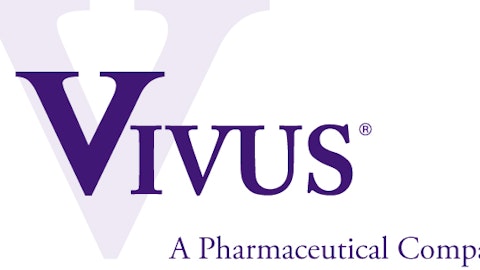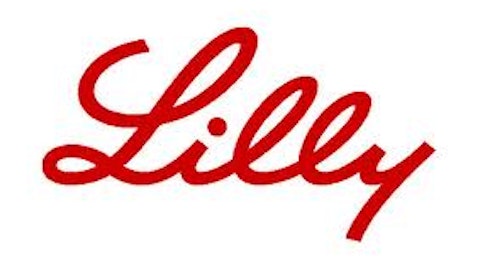Note: This version has been amended to better reflect Victoza’s dosage recommendations.
At the American Diabetes Association meeting last month, Eli Lilly & Co. (NYSE:LLY) presented promising data for the GLP-1 agonist dulaglutide. GLP-1s are a well-established diabetes drug class dominated by Novo Nordisk A/S (ADR) (NYSE:NVO) and Bristol Myers Squibb Co. (NYSE:BMY).

GLP-1 agonists are typically used as a second-line combo therapy for type 2 diabetes patients not responding to metformin and insulin. These drugs are generally well-tolerated and carry little risk of hypoglycemia, which makes this class one of the safest diabetes plays.
But how much could this safe play mean for Eli Lilly & Co. (NYSE:LLY)’s overall health?
GLP-1 market
Twice-daily Byetta was the first GLP-1 to market with a Food and Drug Administration approval in 2005. But Victoza quickly took over after its 2010 approval due to a once-daily dosage. Victoza has maintained a fairly steady climb ever since. The drug achieved 2012 sales of DKK 9.5 billion (or about $1.6 billion according to current conversion rates), and contributed 39% of the company’s overall sales growth.
Bydureon was brought out last year as a once-weekly version of Byetta. It’s still too early after launch to predict Bydureon’s sales growth, but EvaluatePharma pegged the drug as one of the top five “blockbuster duds” in the past year. Bydureon could see soft sales merely because Victoza got there first and patients don’t want to change treatments.
How does dulaglutide stack up?
Would the once-weekly dulaglutide hold its own in the GLP-1 market — or face a future even less certain than Bydureon’s?
Eli Lilly & Co. (NYSE:LLY) offered up data from three late-stage trials that showed dulaglutide outperforming Merck’s DPP-4 Januvia, Byetta, and metformin. Dulaglutide helped patients control blood sugar better than the other drugs and also helped patients lose more weight.
Dulaglutide still has other competitor comparing trials underway. The late-stage trials include Lantus, the company’s own insulin Humalog, and — most importantly — one trial with Victoza. The Victoza trial won’t report until after dulaglutide goes before the FDA for approval later this year. But favorable results could push dulaglutide into a stronger market position.
Other new contenders
There’s also GlaxoSmithKline plc (ADR) (NYSE:GSK)’s late-stage albiglutide, which has achieved mixed results. Albiglutide lowered blood sugar better than Januvia and Sanofi’s Amaryl, but underperformed Victoza. The drug also caused more gastrointestinal side effects in patients than Takeda’s Actos.
GlaxoSmithKline plc (ADR) (NYSE:GSK)’s drug seems too weak to provide much of a threat to Eli Lilly & Co. (NYSE:LLY). But the popularity of Lantus could make Sanofi SA (ADR) (NYSE:SNY)’s candidate more of a player. But let’s go back to how much an Eli Lilly & Co. (NYSE:LLY) victory would really matter to the company.
Eli Lilly & Co. (NYSE:LLY)’s drug dependence
The patent cliff has come for some of Eli Lilly’s top products. Blockbuster atypical antipsychotic Zyprexa fell off the cliff last year. The $5 billion antidepressant Cymbalta loses protection later this year, and the $1 billion osteoporosis drug Evista follows next year.
And Lilly’s pipeline hasn’t fared much better, recently turning into a scrap pile for cancelled Alzheimer’s and rheumatoid arthritis drugs. But the four late-stage diabetes projects have turned up better results. These include the long-acting insulin LY2963016, which is currently under review with the European Medicine’s Agency.
Foolish final thoughts
Eli Lilly stands a better chance than Sanofi or Glaxo in securing a position in the GLP-1 market. The drug might achieve similar sales as Bydureon shortly after launch. But if the Victoza trial results lean in dulaglutide’s favor, the drug will have more room to grow.
How much would the win matter for Lilly? The patent cliff weakened portfolio and faltering CNS pipeline could use any help they could get — even if that comes from a modestly performing diabetes drug.
Brandy Betz has no position in any stocks mentioned. The Motley Fool has no position in any of the stocks mentioned. Brandy is a member of The Motley Fool Blog Network — entries represent the personal opinion of the blogger and are not formally edited.
The article Could This Safe Play Help Eli Lilly? originally appeared on Fool.com is written by Brandy Betz.
Copyright © 1995 – 2013 The Motley Fool, LLC. All rights reserved. The Motley Fool has a disclosure policy.





